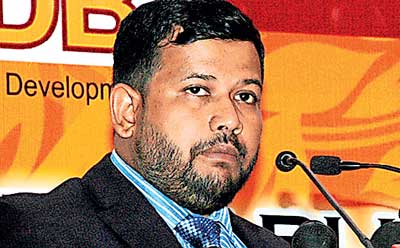Wednesday Feb 18, 2026
Wednesday Feb 18, 2026
Saturday, 8 July 2017 00:00 - - {{hitsCtrl.values.hits}}
The Government has picked three countries to supply 200,000 MT of rice immediately to meet the shortfall in its domestic market, the Industry and Commerce Ministry said in a statement yesterday.
A four-member team of officials left to Pakistan on Friday night to pick rice varieties for the domestic rice market. On 12 July the team will head to Myanmar from Islamabad to test Burmese rice varieties for the Lankan market.
“We have picked Myanmar, Pakistan and India and the country that did not get in was Indonesia,” Industry and Commerce Minister  Rishad Bathiudeen was quoted as saying in the statement.
Rishad Bathiudeen was quoted as saying in the statement.
“The officials after checking both the Pakistani and Myanmar markets will decide whether to choose Pakistan or Myanmar (or both) to purchase the 100,000 MT of rice. Whether it is finally supplied by one or both countries, the purchase shall be at Government to Government levels.”
The team of officials is led by Industry Ministry Secretary Chinthana Lokuhetti, two officials from the Finance Ministry and a food technologist from ITI.
More than 50% of this 100,000 MT of rice will be of the par-boiled (Nadu) variety with the rest being white raw and samba rice.
Sri Lanka is also purchasing an additional 100,000 MT of rice from India immediately. This is not at Government to Government levels but from the Indian private sector. Tenders from private Indian suppliers are being received and the winning Indian supplier is expected to be picked by 17 July.
Meanwhile, Sri Lanka has also commenced Government to Government rice purchase talks with Thailand’s Ministry of Commerce this week. These talks are conducted to procure ‘standby’ buffer rice stocks for any future emergencies and are not for immediate use.
A Sri Lankan team of officials is scheduled to fly to Bangkok next week to meet Thai officials and decide on varieties of possibly around 100,000 MT of rice which will include par-boiled (Nadu), white raw and samba rice.
Last month Minister Bathiudeen had discussions with the Ambassadors and High Commissioners of several countries to decide on rice purchases.
Production of rice, the country’s staple food, is forecast to drop by almost 40% to 2.7 million tonnes in 2017, the UN Food and Agriculture Organization (FAO) and World Food Programme (WFP) warned in a report last month.
It also predicted that the second ‘Yala’ 2017 rice paddy harvest is expected to be at least 24% lower than 2016’s harvest.